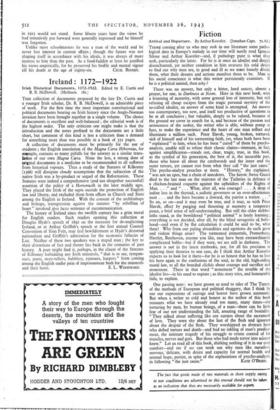Ireland : 1172-1922
Irish Historical Documents, 1172-1922. Edited by E. Curtis and R. B. McDowell. (Methuen. 18s.) Tins collection of documents prepared by the late Dr. Curtis and a younger Irish scholar, Dr. R. B. McDowell, is an admirable piece of work. For the first time the most important constitutional and political documents bearing on Irish history since the Anglo-Norman invasion have been brought together in a single volume. The choice of documents is excellent and well-balanced ; the editorial work is of the highest order. The only criticism one might make is that the introduction and the notes prefixed to the documents are a little short, but comment of this kind is less a criticism than a demand for something more than was possible in a book of 331 pages.
A collection of documents must be primarily for the use of students ; the English translation of the Magna Carta Hiberniae, for caimple, contains as many pitfalls for the unwary as a similar trans- lation of our own Magna Carta. None the less, a strong dose of anginal documents is a medicine to be recommended to all sufferers from historical vapours. Thus a study of the Statutes of Kilkenny (1366) will dissipate cloudy assumptions that the subjection of the - native Irish was a by-product or sequel of the Reformation. These Statutes were indeed a comprehensive (and not altogether successful) assertion of the policy of a Herrengo/k in the later middle ages. They placed the Irish of the septs outside the protection of English law and liberty, and excluded them from offices in Church and State among the English in Ireland. With the consent of the archbishops and bishops, transgression against the statutes " by rebellion of heart" involved ipso facto sentence of excommunication.
The history of Ireland since the twelfth century has a grim moral for English readers. Such readers opening this collection at Douglas Hyde's speech of 1892 on the necessity for de-anglicising Ireland, or at Arthur Griffith's speech at the first annual Council Convention of Sinn Fein, may feel bewilderment at Hyde's distorted nationalism and Griffith's admiration for the economic fallacies of List. Neither of these two speakers was a stupid man ; the key to their distortions of fact and theory lies back in the centuries of past history. A poet might find it, perhaps, in the clause of the Statutes of Kilkenny forbidding any Irish minstrels, " that is to say, tympan- ours, poets, story-tellers, babblers, rymours, harpers." from coming among the English under pain of imprisonment both for the minstrels


























 Previous page
Previous page